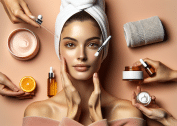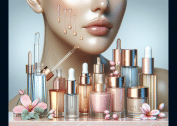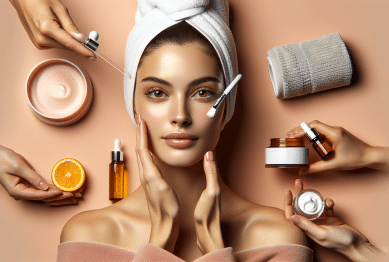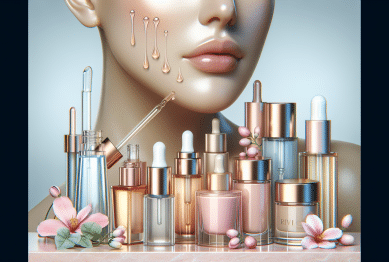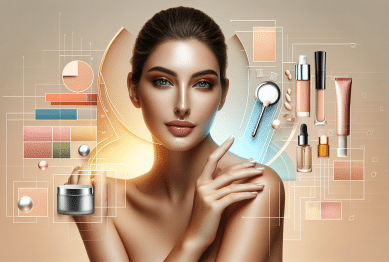Explore proven strategies for radiant skin and lasting beauty at every age. This guide reveals what influences skin health, holistic routines, trending ingredients, and expert-approved approaches to help you achieve a glow from the inside out. Dive into skin science, nutrition, and daily rituals designed to make skin care enjoyable and effective.
The Science Behind Glowing Skin
Many people strive for glowing skin, but understanding what contributes to radiance is a great place to start. Skin, as the body’s largest organ, reflects overall health and well-being. Factors like hydration, collagen production, environmental exposure, and cell renewal work together to create that sought-after glow. Each layer, from the epidermis to the dermis, serves a purpose: shielding from environmental stressors, regulating moisture, and defending against harmful bacteria. Keeping these layers healthy can help support a vibrant complexion that looks and feels firm, smooth, and hydrated.
Beyond visible beauty, the skin is a complex defense system. It’s packed with proteins like keratin and elastin, which contribute to elasticity and strength, while sebaceous glands create natural oils that keep it soft yet protected. Stress, weather, and everyday routines can cause subtle damage or slow recovery, leading to dullness or uneven tone. Studies show that regular gentle cleansing and using products rich in antioxidants, such as vitamin C, can bolster the skin’s natural defenses and brighten its appearance (Source: https://www.ncbi.nlm.nih.gov/pmc/articles/PMC5579659/).
Genetics play a role, but lifestyle influence is significant. Sleep, diet, hydration, and physical activity all interact with the skin’s repair cycle. Research highlights the importance of routines that blend skincare and self-care for noticeable changes over time. By choosing effective, gentle products and healthy habits, many people uncover the secret to a consistently glowing complexion without harsh treatments. Each nourished cell adds up, gradually working towards a natural radiance that’s both visible and meaningful.
Daily Routines for Optimal Skin Health
Consistency is key when it comes to skincare. A simple but dedicated daily routine is powerful for maintaining and improving skin tone, elasticity, and hydration. Begin with a gentle cleanser to remove pollutants and excess oils, leaving skin ready for serums and moisturizers. Light exfoliation several times a week encourages healthy turnover and keeps pores clear, which is vital for glowing skin and a smooth texture. Avoid aggressive scrubbing, as it may cause microtears and inflammation.
Protecting the skin daily from ultraviolet (UV) damage is crucial. Dermatologists recommend broad-spectrum sunscreen with SPF 30 or higher, regardless of weather or skin tone. Regular sunscreen use helps prevent premature aging and dark spots, while supporting collagen health for long-term vibrance. Applying moisturizer while skin is still slightly damp helps seal hydration, making skin feel both comfortable and bouncy throughout the day (Source: https://www.aad.org/public/everyday-care/skin-care-basics/care/skin-care-tips).
The world of serums and treatments can be overwhelming. Focus on proven ingredients like hyaluronic acid for plumping, niacinamide for calming, and peptides for firming. Introducing one new product at a time can make it easier to spot what works or triggers irritation. Gentle, informed routines that evolve with changing needs form the backbone of long-term wellness for the skin. Celebrate small victories—a soft touch, a glow in natural light—as they build confidence and signal that you’re nurturing yourself.
Nutrition’s Role in Lasting Beauty
The link between what’s on the plate and what’s reflected in the mirror is strong. Certain nutrients support collagen production, aid cell repair, and help defend against oxidative stress. Omega-3 fatty acids, found in flaxseeds, walnuts, and salmon, assist in retaining moisture and reducing redness. Colorful fruits and vegetables are loaded with carotenoids and polyphenols, which act as antioxidants to help skin recover from daily exposure to pollutants.
Research supports eating a balanced diet rich in vitamins A, C, and E for enhanced resilience and even tone (Source: https://lpi.oregonstate.edu/mic/health-disease/skin-health). Vitamin C, in particular, is crucial for collagen formation and defense against environmental stressors. Drinking sufficient water doesn’t just hydrate internally—it can have visible benefits for surface hydration and elasticity. Avoiding excess processed sugars and prioritizing whole foods is a habit that provides both quick and gradual rewards for the complexion.
Supplements for skin have gained popularity. However, true beauty starts with real food and daily nutrition. Before adding any supplements, it helps to consult with a healthcare provider or dermatologist. Targeted ingredients—like zinc and selenium—may play a role in addressing blemishes or sensitivity, but results are best when they complement an overall nourishing diet. Finding joy in meals filled with nutrients can transform skin health and make each day feel more vibrant.
Trending Ingredients and Their Impact
The beauty industry releases new star ingredients every year, but only a few stand out for both effectiveness and safety. Niacinamide, a form of vitamin B3, soothes visible redness and supports a more even-looking skin. Hyaluronic acid draws water into the skin, instantly improving plumpness without feeling greasy. Meanwhile, retinoids—derived from vitamin A—encourage collagen renewal and reduce the appearance of fine lines when used as part of a thoughtful regimen.
Natural ingredients like aloe vera and green tea extract have been valued in wellness traditions for centuries. Clinical studies show that aloe can promote wound healing and calm irritation, while green tea polyphenols offer antioxidant protection and help to even out pigmentation (Source: https://www.ncbi.nlm.nih.gov/pmc/articles/PMC3612440/). These ingredients bridge the gap between ancient wisdom and today’s evidence-based skincare, making them popular choices in both traditional and modern routines.
When testing new actives, patience is important. Most changes—from smoothing to brightening—occur gradually, over weeks. Always start with patch tests and follow with regular observation to track subtle results. Instead of chasing every trend, a balanced approach that includes both classic and innovative ingredients can help cultivate a resilient, beautiful complexion. Understanding your own skin’s unique preferences is a vital step in making ingredient choices that produce meaningful and lasting benefits.
Mindful Beauty Rituals for Self-Care
Beauty is not just a physical attribute—it’s an experience rooted in self-respect and calm routines. Incorporating mindful practices into skincare, such as gentle massage or deep breathing, can help reduce the effects of daily stress on the skin. Enjoying the sensation of applying cream or the natural aroma of botanical oils anchors each routine in the present moment, turning a simple task into a form of meditation.
Studies find that feelings of self-worth are boosted by dedicated rituals, affirming the connection between mind and body (Source: https://www.ncbi.nlm.nih.gov/pmc/articles/PMC6617305/). Small habits, like gently tapping serum into the skin or pausing to set intentions, can promote emotional well-being, leading to subtle improvements in skin appearance. Approaching self-care with patience and curiosity helps transform routines from chores into celebrations of self-acceptance and renewal.
Not every day is perfect for routines, and that’s okay. The goal is not a flawless appearance, but a sense of connection with yourself, even during stressful or busy times. Occasional face masks, warm cloth compresses, or quiet mornings spent in reflection can reframe beauty as an achievable pleasure. Every mindful choice plants seeds for confidence, healthy aging, and the soft glow that comes from holistic care.
Expert Tips on Avoiding Common Pitfalls
Misinformation can lead to over-exfoliation or harsh product layering that disrupts natural balance. Experts recommend avoiding the urge to switch routines too frequently; instead, give products time to reveal effects. Overuse of strong ingredients, such as acids or retinoids, can result in irritation, dryness, and irregular tone rather than desired results.
One frequently overlooked step is patch testing when introducing a new product. Dermatologists advise applying a small amount behind the ear or on the wrist, then monitoring for reactions over 24 hours. Additionally, avoid using expired products, as their efficacy decreases and potential for problems increases. A streamlined approach, focused on listening to your skin’s needs, can prevent setbacks and support continuous improvement (Source: https://www.clevelandclinic.org/health/diseases/17792-skin-care-basics).
Becoming attuned to environmental influences also makes a difference. Factors such as pollution or hard water may drive changes to routines or ingredient choices. Expert sources emphasize that making adjustments seasonally can help skin feel comfortable and protected all year long. Seeking advice from credentialed professionals, not just trends, is always a wise step for sustainability and well-being.
References
1. Pullar, J. M., Carr, A. C., & Vissers, M. C. (2017). The roles of vitamin C in skin health. Nutrition, 9(8), 866. Retrieved from https://www.ncbi.nlm.nih.gov/pmc/articles/PMC5579659/
2. American Academy of Dermatology. (n.d.). Skin care tips dermatologists use. Retrieved from https://www.aad.org/public/everyday-care/skin-care-basics/care/skin-care-tips
3. Linus Pauling Institute at Oregon State University. (n.d.). Micronutrients and skin health. Retrieved from https://lpi.oregonstate.edu/mic/health-disease/skin-health
4. Mukherjee, P. K., Maity, N., Nema, N. K., & Sarkar, B. K. (2011). Bioactive compounds from natural resources against skin aging. Phytomedicine. Retrieved from https://www.ncbi.nlm.nih.gov/pmc/articles/PMC3612440/
5. Azevedo, K. J., & da Silva, M. T. (2019). The relationship between self-compassion, mindfulness, and skin symptoms. International Journal of Women’s Dermatology. Retrieved from https://www.ncbi.nlm.nih.gov/pmc/articles/PMC6617305/
6. Cleveland Clinic. (n.d.). Skin care basics. Retrieved from https://www.clevelandclinic.org/health/diseases/17792-skin-care-basics


